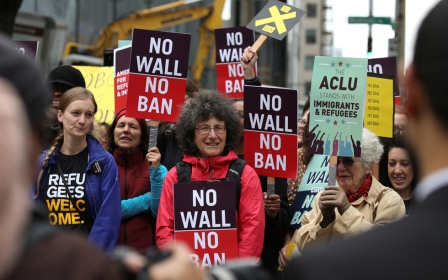US sets criteria for visa applicants from six Muslim countries

The US Supreme Court on Monday handed a victory to Donald Trump by narrowing the scope of lower court rulings that blocked his travel ban on people from six Muslim-majority countries and agreeing to hear his appeals in the cases.
The court said it would hear arguments on the legality of one of the US president's signature policies in his first months in office in the court's next term, which starts in October.
The justices granted parts of his administration's emergency request to put the 6 March executive order into effect immediately while the legal battle continues. The court also said it would partly allow a 120-day ban on all refugees entering the United States to go into effect.
The court said the ban will apply "to foreign nationals who lack any bona fide relationship with a person or entity in the United States".
Hawaii's attorney general, Douglas Chin, who successfully challenged the ban in lower courts, said that students from affected countries due to attend the University of Hawaii would still be able to do so.
The ban will partly go into effect 72 hours after the court's decision. The Department of Homeland Security promised clear and sufficient public notice in coordination with the travel industry
The US Supreme Court on Monday handed a victory to Donald Trump by narrowing the scope of lower court rulings that blocked his travel ban on people from six Muslim-majority countries and agreeing to hear his appeals in the cases.
The court said it would hear arguments on the legality of one of the US president's signature policies in his first months in office in the court's next term, which starts in October.
The justices granted parts of his administration's emergency request to put the 6 March executive order into effect immediately while the legal battle continues. The court also said it would partly allow a 120-day ban on all refugees entering the United States to go into effect.
The court said the ban will apply "to foreign nationals who lack any bona fide relationship with a person or entity in the United States".
Hawaii's attorney general, Douglas Chin, who successfully challenged the ban in lower courts, said that students from affected countries due to attend the University of Hawaii would still be able to do so.
The ban will partly go into effect 72 hours after the court's decision. The Department of Homeland Security promised clear and sufficient public notice in coordination with the travel industry
The US Supreme Court on Monday handed a victory to Donald Trump by narrowing the scope of lower court rulings that blocked his travel ban on people from six Muslim-majority countries and agreeing to hear his appeals in the cases.
The court said it would hear arguments on the legality of one of the US president's signature policies in his first months in office in the court's next term, which starts in October.
The justices granted parts of his administration's emergency request to put the 6 March executive order into effect immediately while the legal battle continues. The court also said it would partly allow a 120-day ban on all refugees entering the United States to go into effect.
The court said the ban will apply "to foreign nationals who lack any bona fide relationship with a person or entity in the United States".
Hawaii's attorney general, Douglas Chin, who successfully challenged the ban in lower courts, said that students from affected countries due to attend the University of Hawaii would still be able to do so.
The ban will partly go into effect 72 hours after the court's decision. The Department of Homeland Security promised clear and sufficient public notice in coordination with the travel industry
The Trump administration will require visa applicants from six predominantly Muslim countries and all refugees to have a close family or business tie to the United States, the Associated Press reported late on Wednesday.
The new guidelines, issued after the Supreme Court partially restored US President Donald Trump's executive order, say that applicants must prove a relationship with a parent, spouse, child, adult son or daughter, son-in-law, daughter-in-law or sibling in the United States, AP said, citing a State Department cable.
It said grandparents, grandchildren, aunts, uncles, nieces, nephews, cousins, brothers-in-law and sisters-in-law, fiancée or other extended family members are not considered to be close relationships.
The US Supreme Court on Monday handed a partial victory to Trump by narrowing the scope of lower court rulings that blocked his travel ban on people from six Muslim-majority countries and agreeing to hear his appeals in the cases.
The court said it would hear arguments on the legality of one of the president's signature policies in his first months in office in the court's next term, which starts in October.
The justices granted parts of his administration's emergency request to put the 6 March executive order into effect immediately while the legal battle continues. It called for a 90-day ban on travellers from Libya, Iran, Somalia, Sudan, Syria and Yemen and a 120-day ban on all refugees entering the US to enable the government to implement stronger vetting procedures.
The court said the ban will apply "to foreign nationals who lack any bona fide relationship with a person or entity in the United States".
The ban will partly go into effect 72 hours after the court's decision. The Department of Homeland Security promised clear and sufficient public notice in coordination with the travel industry.
Middle East Eye propose une couverture et une analyse indépendantes et incomparables du Moyen-Orient, de l’Afrique du Nord et d’autres régions du monde. Pour en savoir plus sur la reprise de ce contenu et les frais qui s’appliquent, veuillez remplir ce formulaire [en anglais]. Pour en savoir plus sur MEE, cliquez ici [en anglais].





